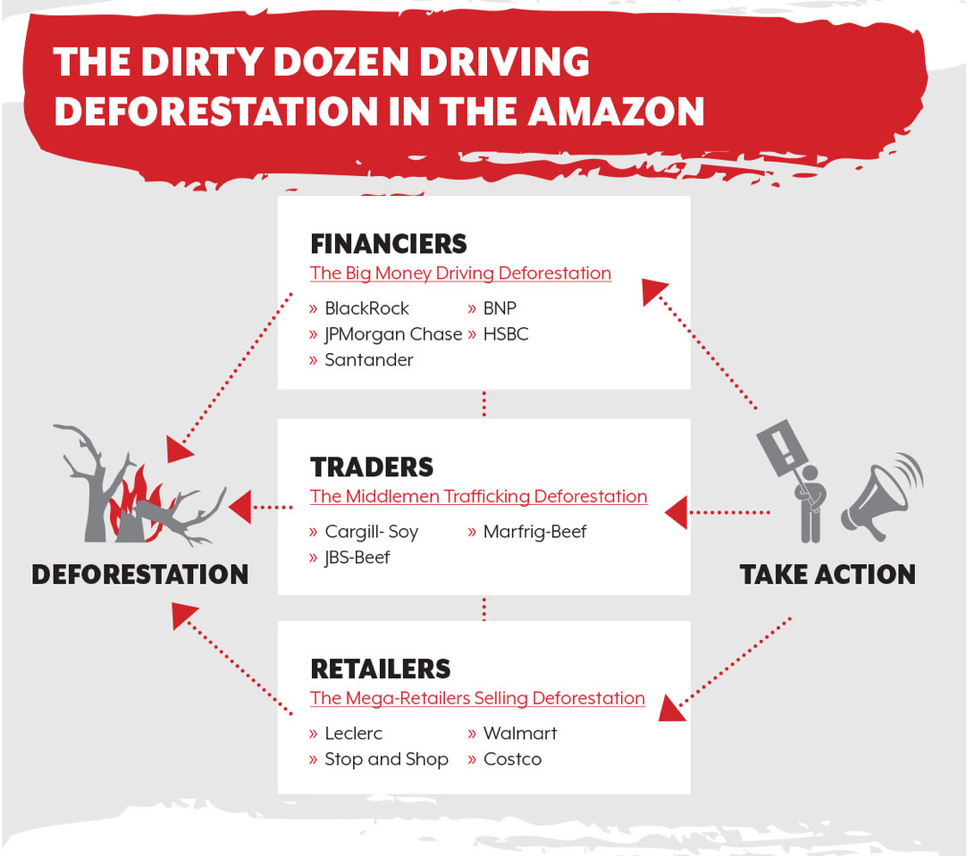Actualités
As the Amazon burns will financiers step up to reform Brazil’s aggressive agribusiness sector?

Key findings:
- There have been 72,843 fires in Brazil this year, 84% more than the same period last year.
- Deforestation has spiked by 54%[1]under Bolsonaro’s presidency due to the aggressive policies that override decades of environmental conservation and human rights[2].
- Attacks on indigenous land rights have led to an increase of 150% of land-grabbing by the agribusiness sector[3]
- Brazil is now the most dangerous country to be an environmental and human rights defender with 57 people killed last year in confrontations with ranchers, loggers, miners and poachers[4].
Brazil is facing a profound crisis as massive fires rage through the Amazon rainforest. Spurred on by president Bolsonaro’s regressive policies that strip indigenous peoples of their rights and encourage farmers to set fires to clear rainforest for agricultural expansion. A recent report from NGO Amazon Watch showed how many US and European companies, like Cargill and ADM, and financiers including Blackrock, JP Morgan Chase and Santander are complicit in Amazon destruction.
These companies and financiers have come under international scrutiny as activists came together for a Global Day of Action for the Amazon which took place in 20 countries on 5 September 2019 to demand action to protect forests and human rights. Financial institutions in the US and Europe have been fuelling and profiting from this disaster instead of using their influence to reform forest-risk commodity companies operating in Brazil. Financiers of big agribusiness can exert their substantial influence to reign in the lawless resource plunder and human rights abuses witnessed in Brazil.

Source: Amazon Watch, Extinction Rebellion, APIB
US and European Financing of Soy & Beef
The leading drivers of deforestation in the Brazilian Amazon and Cerrado are the beef and soy industries which together account for 80% of Amazon deforestation[5]. Amazon Watch’s report identifies some of the worst actors, connected to illegality, human rights abuses, corruption and massive environmental destruction, and the global financial institutions that enable them.
The traders which dominate the global grain trade, ADM, Bunge, Cargill and Louis Dreyfus received over USD 1 billion in credit. However, Bunge and Cargill were among 5 major traders and farmers who received environmental fines of USD 27 million for purchasing soy and other grains from embargoed farms which destroyed protected areas of the Cerrado biome USD 27 millionr[6].

Source: Amazon Watch
JBS, Marfrig and Minerva are the three largest beef processors in Brazil, accounting for about 70% of all cattle slaughtered and have major operations in the Amazon[7]. All three of these companies receive financing from EU and US yet have close connections to suppliers engaged in illegal activities. The ranching company Agropecuaria Rio de Areia supplies all of them despite being fined five times for illegal Amazon deforestation, totaling USD 1.2 million[8].

Source: Amazon Watch
How financiers can press for reform
It is clear that financial institutions doing business with many of the companies operating in forest-risk commodities in Brazil are exposing themselves to reputational, operational and regulatory risks[9]. Financiers have an opportunity to curb deforestation and it would be in their interests to take accountability for the actions of their clients. Calls are growing for the financial sector to address deforestation as an all-encompassing Environmental (climate and biodiversity), Social (land grab), Governance (supply chain management) risks in their clients supply chain.
Financial institutions that lend to, underwrite, or invest in companies operating in the Brazilian Amazon should commit to a No Deforestation policy and undertake due diligence of their clients to ensure they are implementing it through their suppliers. They should also commit and ensure the implementation of international human rights standards that explicitly protect indigenous peoples and their land rights.